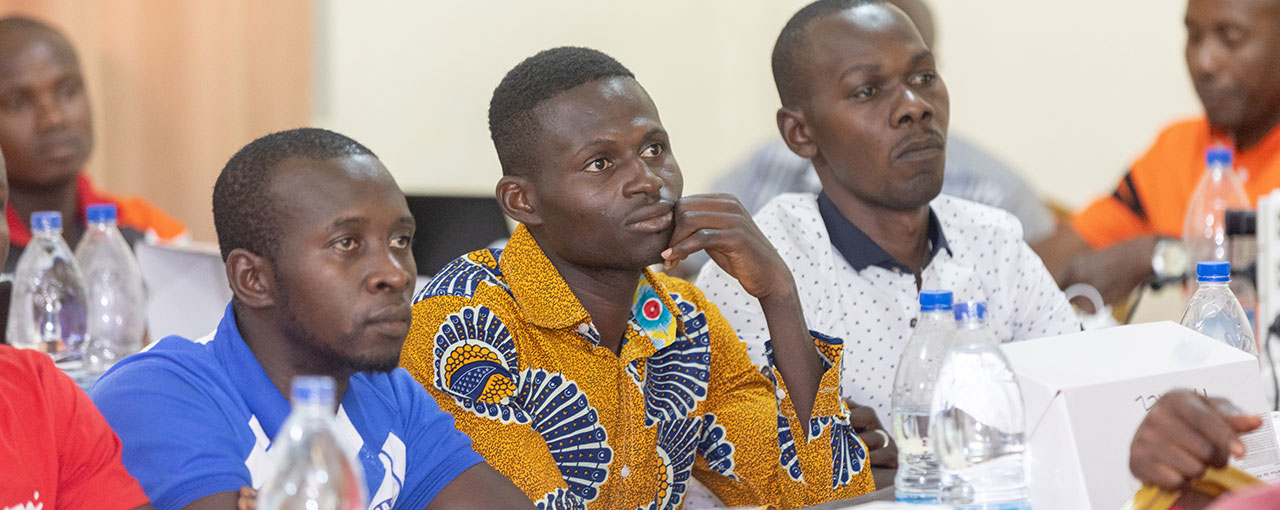Coop Academy program
Connections that help to equip cooperative leaders with the skills they need
Most of the world’s cocoa is grown on small family farms. Over time, farmer cooperatives developed in countries like Côte d’Ivoire and Cameroon to help these farmers as they sought to generate livelihoods for their families and communities.
Cooperatives have proven that they are an exceptionally good model for cocoa farmers to access shared resources and knowledge, and then convert that into higher productivity and livelihoods for themselves and their families. They are also key vehicles for rural development across cocoa-growing regions in West Africa. For cooperatives to be successful, it’s crucial that their leaders possess skills in business management, finance, digitalization and more.
As a company at the center of cocoa supply chains connecting farmers to markets, we have seen first-hand how cooperatives with strong leadership can have a substantial positive impact. It’s why we created the Coop Academy program.
A track record of success
Founded in 2013 in partnership with the International Finance Corporation (IFC) and building on our strong local relationships, the Coop Academy gives cooperative leaders in Côte d’Ivoire and Cameroon an immersive experience in how to better manage their organizations. It combines intensive classroom training with personalized coaching in the field. By helping them professionalize, the Coop Academy is setting up cooperatives, their farmers and their communities for long-term success.
To do this, we are working closely with our network of implementing partners who have deep expertise in these areas. In Côte d’Ivoire, this initiative is implemented in partnership with TechnoServe, a non-profit organization that develops business solutions to poverty, INPHB (Côte d’Ivoire’s leading university), the Sustainable Trade Initiative (IDH), and Empow’Her.
“ Coop Academy is a unique opportunity for leaders of cocoa cooperatives to professionalize their organizations in order to overcome the main challenges of the sector, such as access to financing, child labor, traceability, women's leadership, and deforestation.
As an industry, we will continue to look beyond productivity and bring lessons learnt together to be able to scale solutions.
Supporting tomorrow’s cocoa sector
In 2019, Cargill and IFC launched Coop Academy 2.0 to add key new focus areas to the core programming centered on business management. In total, the Coop Academy is now focused on training future-ready leaders in topics like:
- Training and coaching: Cooperative leaders chart the future of their organizations by building a transformation map, and then work with coaches to implement the changes needed to get there in areas such as cooperative’s management, business planning, leadership and human resources, among others.
- Digital financial services: Since in many rural areas there are limited financial institutions, making mobile banking the most practical solution.
- Sustainability: By introducing good agricultural best practices.
- Regulations: As requirements in this area have been changing, training will help cooperatives remain competitive and resilient.
- Gender equity: We are training cooperative leaders on gender issues in partnership with Empow’her. Also, we aim to provide women linked to the Coop Academy with training and coaching to establish new entrepreneurial activities that grow their livelihoods.
What it means for cooperatives
Through the Coop Academy, cooperatives see clear benefits thanks to leaders who are better prepared to navigate a changing cocoa sector.
- Financial resilience: Access to bank loans, skills in financial management and know-how in digital payments all keep cooperatives strong.
- Higher productivity and profitability: Well-established, sustainable and innovative best practices on the farm enable cooperative members to grow more and earn more. This raises their profitability by making their on-farm economic activity more efficient.
- Market access: By building first-mile traceability into their networks so end users know where and how their cocoa was grown, cooperatives and farmers can ensure they will continue to have access to the best markets where their products are most valued, also it brings credibility and financial security to them.
Together with our partners, we continue to bring lessons learnt together and scale solutions to help farmers earn a living income.
In their own words
Leaders of cooperatives have used the Coop Academy to grow key skills that will help them serve their members and be more successful together. Here are what a few of them have said about their experiences in the Coop Academy:
“When I arrived at the cooperative, I did everything! I was both a storekeeper and an accountant. Two years later, the Chairman of the Board entrusted me with the management of the cooperative … But it was all very basic. After the integration into the certification process, our partner Cargill decided to initiate the Coop Academy to train the leaders of the cocoa cooperatives in good governance.”
- Soro Kafiehe, from SCOOPABINKADI cocoa cooperative.
“I am quite close to some cooperatives in our region, such as Coopaproman and Coopama: two cooperatives that participated in the Coop Academy a few years ago and have progressed significantly. They have reached a stage of development and influence that I could only dream of. So I wanted our cooperative to participate in order to move to a more rapid stage of development.”
- Kouame Kouame Tani, from SCAES cocoa cooperative
“Cargill helped us to stand out, to flourish, and to always remain at a high level. We have benefited from all the training and support programs since we started.”
- Camille Abou Oi Abou, from CAMEYE cocoa cooperative
Progress reported in 2022:
- 700 cooperative leaders from 70 organizations have participated in the Coop Academy in Côte d’Ivoire and Cameroon. Another 700 participants from 70 additional organizations are expected to graduate by the end of 2023.
- The training has helped cooperatives gain access to more than £11 million in commercial financing so far.
- Of the 2,200 women who have already participated in training to expand income-generating entrepreneurship, 95% reported an increase in income.
If not mentioned elsewise, all West Africa photos in relation to sustainability are by Sandrine Bénitah « @Sandrine Bénitah »

